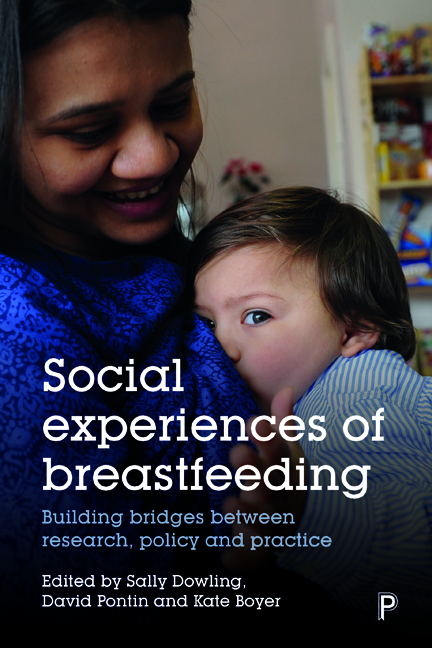Book contents
- Frontmatter
- Dedication
- Contents
- List of tables and figures
- Notes on contributors
- Acknowledgements
- Introduction
- The UK policy context: reconfiguration of the Unicef UK Baby Friendly Initiative to reflect the importance of relationships and ensuring sustainability
- Part I Breastfeeding and emotions
- Part II Cultures of breastfeeding
- Part III Breastfeeding and popular culture
- Conclusion
- Appendix: Schedule for ESRC Seminar Series: Social Experiences of Breastfeeding: Building bridges between research and policy, 2015–16
- Index
four - Weaving breastfeeding practices into policy
Published online by Cambridge University Press: 22 April 2022
- Frontmatter
- Dedication
- Contents
- List of tables and figures
- Notes on contributors
- Acknowledgements
- Introduction
- The UK policy context: reconfiguration of the Unicef UK Baby Friendly Initiative to reflect the importance of relationships and ensuring sustainability
- Part I Breastfeeding and emotions
- Part II Cultures of breastfeeding
- Part III Breastfeeding and popular culture
- Conclusion
- Appendix: Schedule for ESRC Seminar Series: Social Experiences of Breastfeeding: Building bridges between research and policy, 2015–16
- Index
Summary
Introduction
Breastfeeding faces a public health crisis due to the wide gap between policy recommendations and its uptake by women as a practice. At its core, the breastfeeding crisis is a crisis of support that comes at a time when budgetary cuts are deeply affecting breastfeeding support services. I argue here that, if we are to tackle this gap, we need an approach that can incorporate the disparate elements at play in this crisis, an approach that moves away from focusing on breastfeeding solely as a woman's individual behaviour. I propose we focus on the practice of breastfeeding.
A practice-based approach moves away from the notion that how people behave is an issue of individual choice (Shove et al, 2012). There is already a diverse array of research that focuses on the health-related and the wider emotional, social and cultural issues that affect breastfeeding, but it tends to be fragmented. What these studies highlight in different ways, is that breastfeeding cannot be properly understood as an issue solely between mothers and babies, but needs to be considered in the web of relations in which diverse mothers and babies are entangled (Newell, 2013). I suggest focusing on practices that can bring together this wealth of research in a way that can inform policy practices.
This chapter explores breastfeeding as a practice through a sociological and geographical perspective. More particularly, I will follow closely Shove's work on social practices (Shove et al, 2012; Shove, 2014) to think about the everyday practice of breastfeeding. The aim is to change the type of questions asked about breastfeeding, and to change how the issue is framed, to inspire people to develop alternative policy proposals (Shove et al, 2012). I describe first what a practice-based approach means and looks like, and how it differs from behaviouralist approaches. I then analyse the elements and histories that make up breastfeeding practice today, while outlining its competing practice (feeding using infant formula) and end with thoughts on how these may move policy forward.
- Type
- Chapter
- Information
- Social Experiences of BreastfeedingBuilding Bridges between Research, Policy and Practice, pp. 71 - 86Publisher: Bristol University PressPrint publication year: 2018



